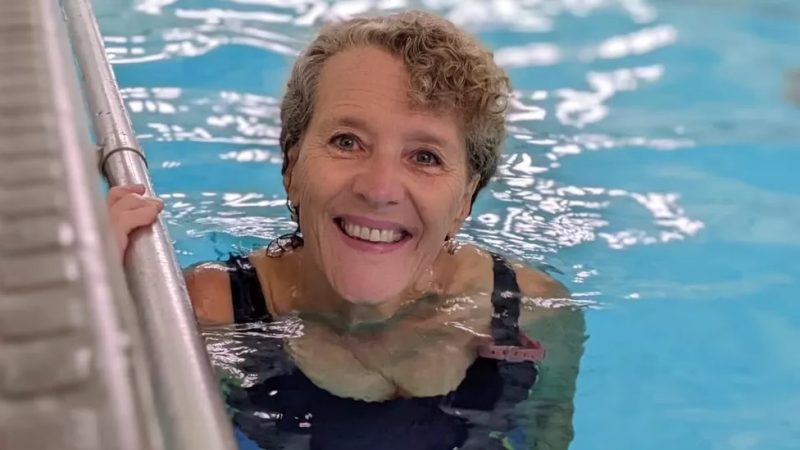At 70 years old, Margaret Phillips never imagined her life would take such a drastic turn. After 45 years of marriage, she suddenly found herself navigating the overwhelming waters of grief following the unexpected death of her husband, George.

For Margaret, the loss of her husband left a void too deep to fill. “He was my rock, my best friend. I didn’t know how to face life without him,” she recalls with tears in her eyes. The days following George’s passing were a blur of sorrow, as she struggled to come to terms with a life without her lifelong partner. But amid her grief, a suggestion from her daughter gave her a lifeline she didn’t expect.
Encouraged by her family to find a healthy outlet for her emotions, Margaret reluctantly agreed to try swimming, a pastime she had not embraced since her teenage years. Little did she know that stepping into the pool would be the first step toward reclaiming a sense of peace and purpose in her life.
“I didn’t want to go at first,” Margaret admits. “But the minute I got into the water, I felt something shift inside me. It was as if the weight of my grief lifted, even if just for a few moments.”
The rhythmic motion of swimming soon became Margaret’s solace. The water, cool and steady, provided a sense of comfort she hadn’t felt since her husband’s passing. It offered her a space where she could quiet her mind, focus on her body’s movements, and temporarily escape the constant ache of loss.
Swimming, for Margaret, was more than just a form of exercise; it became her emotional sanctuary. Every stroke through the water was a step forward in her journey of healing. The act of submerging herself in the pool felt symbolic of letting go—if only momentarily—of the grief that weighed her down.
“Being in the water gave me something to look forward to,” Margaret explains. “It gave me time to reflect, to remember George, and to feel connected to him in a way that didn’t hurt so much.”
Margaret’s newfound routine offered more than physical and emotional relief. It also connected her with a community of fellow swimmers, many of whom had their own stories of loss and healing. Surrounded by people who understood the value of having a safe space to process emotions, she felt less alone in her grief.
Over time, Margaret’s swimming routine helped rebuild her physical strength, but more importantly, it restored a sense of emotional resilience. In the months that followed, she found herself returning to the pool several times a week. It became her escape from the quiet house and her loneliness, allowing her to channel her grief into something positive.
“Swimming has given me back a piece of myself that I thought I lost when George passed,” she says. “It’s not that I don’t miss him—I always will. But now, I have something that helps me cope with the pain.”
Today, Margaret continues to swim as part of her regular routine. The pool has become her place of refuge, her sanctuary. While the grief never fully disappears, she has found a way to manage it, one lap at a time.
Margaret’s story serves as a reminder that healing comes in many forms. For her, swimming provided a way to process her emotions, rebuild her strength, and regain a sense of control in the wake of loss. Whether through physical activity, creativity, or connection with others, finding a way to channel grief can help in navigating the toughest of life’s challenges.
As Margaret puts it, “The water became my refuge. It didn’t erase the pain, but it gave me a way to move through it, and for that, I’m forever grateful.”
Margaret’s journey illustrates that even in the depths of sorrow, there can be moments of respite. For those grappling with loss, her story offers hope—that through physical movement, emotional reflection, and community, there is a path to healing, even in the most difficult of times.
